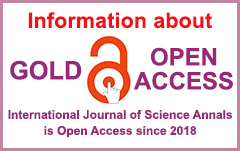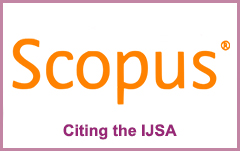Еmpathy in the Structure of Psychological Competence of the Teacher of the Higher Educational Institution
Mitina S. V. 1
| 1 V. I. Vernadsky Taurida National University, Ukraine |
Abstract
Background and Aim of Study: The efficiency of pedagogical activity depends not only of the level of professional knowledge and abilities of the teacher but also of the presence for him of the personality qualities necessary for optimal cooperation. One of such professionally-meaningful qualities of the teacher is the empathy able to do the process of education emotionally comfortable and productive. The aim of the study: to explore of level of empathy’s display of the teachers depending on experience of their pedagogical activity.
Material and Methods: Theoretical (analysis and synthesis of the psychological literature); empirical (pilot study). 97 teachers of the higher educational institutions participated in the study; at the age of 27 to 62 years, with the work experience from 1 year to 30 years.
Results. The results obtained indicate that the empathy is the important component in the structure of the professional competence of the teacher of the higher educational institution, and also that the empathic ability of the teacher is transformed with the development of life and professional experience. The empirical research shows the lowest rates of empathy among the teachers with the work experience of more than 25 years and among the young teachers with the work experience up to 10 years.
Conclusions.It is concluded that there is the dependence of the empathy of professional experience, necessary to develop the empathy both at the stage of the training of the future teachers in the higher educational institutions and in the process of continuous professional education.
Keywords
competence, psychological competence, teacher, pedagogical activity, empathy.
References
Baron-Cohen, S., & Wheelwright, S. (2004). The empathy quotient: an investigation of adults with Asperger Syndrome or high functioning autism, and normal sex differences. Journal of Autism and Developmental Disorders, 34(2), 163–175. doi:10.1023/B: JADD.0000022607.19833.00
Boyko, V. V. (1996). Energiia emotsii v obshchenii: vzgliad na sebia i na drugikh [The energy of emotions in communication: a look at yourself and others]. [DX Reader version]. Retrieved from: https://osp.kgsu.ru/library/PDF/389.pdf [in Russian]
Cooper, B. (2004). Empathy, interaction and caring: Teachers’ roles in a constrained environment. Pastoral Care in Education, 22(3), 12–21. doi:10.1111/j.0264-3944.2004.00299.x
Dolby, N. (2013). The decline of empathy and the future of liberal education. Liberal Education, 99(2), 60–64.
Goroshit, M., & Hen, M. (2016). Teachers’ empathy: can it be predicted by self-efficacy? Teachers and Teaching: Theory and Practice, 22(7), 805–818. doi:10.1080/13540602.2016.1185818
Holovan, M. S. (2014). Profesiina kompetentnist vykladacha vyshchoho navchalnoho zakladu [Professional competence of a teacher of a higher educational institution]. Problemy suchasnoi pedahohichnoi osvity: Pedahohika i psykholohiia – Problems of modern pedagogical education: Pedagogy and Psychology, 44, 79–88. [in Ukrainian]
Ilin, E. P. (2013). Psikhologiia pomoshchi. Altruizm, egoizm, empatiia [Psychology of help. Altruism, selfishness, empathy]. St. Petersburg: Piter. [in Russian]
Kuntsevska, A. V. (2004). Empatiia u systemi profesiinykh zdatnostei fakhivtsiv sotsionomichnykh profesii [Empathy in the system of professional skills of specialists in socio-occupational professions]. Aktualni problemy psykholohii – Actual problems of psychology, 7(2), 193–197. [in Ukrainian]
Kyrychok, V. A., Mitina, S. V., & Ilchenko, A. A. (2017). Communicative competence formation of a higher educational institution lecture by means of interactive technology in teaching and education. Deutscher Wissenschaftsherold, 1, 38–41. doi:10.19221/2017.18
Melnyk, Yu. (2017). Study of trends of students’ demand for the formation of competences by higher educational institutions. Science and Education, 5, 128–134. doi:10.24195/2414-4665-2017-5-22
Mitina, S. V. (2016). Psykholohichna skladova v strukturi profesiinoi kompetentnosti vykladacha vyshchoho navchalnoho zakladu [Psychological component in the structure of professional competence of a teacher of a higher educational institution]. In Т. V. Kolbina, & Yu. B. Melnyk (Eds.), Aktualni pytannia osvity i nauky – Current issues of education and science (pp. 301–305). Kharkiv: KRPOCH. doi:10.26697/9789669726070.2017.301 [in Ukrainian]
Mitina, S. (2017). The factors of emotional burnout of the teacher of the higher educational institution. Psychological and pedagogical problems of modern specialist formation, 1, 34–37. doi:10.26697/9789669726094.2017.34
Orishchenko, O. A. (2015). Psikhologicheskii portret lichnosti s vysokim urovnem empatii [Psychological portrait of a person with a high level of empathy]. Science and Education a New Dimension. Pedagogy and Psychology, 3(28), 86–88. [in Russian]
Popova, T. S., & Horvat-Yanushevska, I. I. (2013). Empatiia ta yii rol u vzaiemodii sotsialnoho pratsivnyka z kliientom [Empathy and its role in the interaction of a social worker with a client]. Naukovi pratsi. Sotsiolohiia – Scientific works. Sociology, 225(213), 116–120. Retrieved from: https:// nbuv.gov.ua/UJRN/Npchdusoc [in Ukrainian]
Sannikova, O. P. (2014). Kontynualno-iierarkhichna model emotsiinosti [The continuum-hierarchical model of emotionality]. Nauka i osvita – Science and Education, 1, 44–50. [in Ukrainian]
Shestopaliuk, O. V. (2011). Formuvannia profesiinoi kompetentnosti vykladacha VNZ [Formation of professional competence of a teacher of higher education]. Suchasni informatsiini tekhnolohii ta innovatsiini metodyky navchannia v pidhotovtsi fakhivtsiv: metodolohiia, teoriia, dosvid, problem – Modern information technologies and innovative methods of training in the training of specialists: methodology, theory, experience, problems, 28, 4–9. Retrieved from: https:// nbuv.gov.ua/UJRN/Sitimn [in Ukrainian]
Stojiljkovic, S., Djigić, G., & Zlatković, B. (2012). Еmpathy and teachers’ roles. Procedia – Social and Behavioral Sciences, 69, 960–966. doi:10.1016/j.sbspro.2012.12.021
Strelnikov, V. Iu. (2013). Komponenty profesiinoi kompetentnosti vykladacha vyshchoi shkoly [Components of the professional competence of the teacher of higher education]. Humanitarnyi visnyk – Humanitarian Herald, 28(1), 278–285. Retrieved from: https://nbuv.gov.ua/UJRN/gvpdpu [in Ukrainian]
Vitvytska, S. S. (2006). Osnovy pedahohiky vyshchoi shkoly [Fundamentals of higher education pedagogy]. [DX Reader version]. Retrieved from: https://194.44.152.155/elib/local/sk702798.pdf [in Ukrainian]
Zhuravlova, L. P. (2007). Psykholohiia empatii [Psychology of empathy]. [Monograph]. Retrieved from https:// eprints.zu.edu.ua/209381.pdf [in Ukrainian]
Information about the author:
Mitina Svitlana Vladimirovna – https://orcid.org/0000-0001-9520-0272; Doctor of Philosophy in Psychology, Associate Professor, Professor of the Department of Psychology and Pedagogy; V. I. Vernadsky Taurida National University, Kyiv, Ukraine.
Cite this article as:
APA
Mitina, S. V. (2018). Empathy in the structure of psychological competence of the teacher of the higher educational institution. International Journal of Science Annals, 1(1-2), 28–33. https://doi.org/10.26697/ijsa.2018.1-2.04.
Harvard
Mitina, S. V. 2018. "Еmpathy in the structure of psychological competence of the teacher of the higher educational institution". International Journal of Science Annals, [online] 1(1-2), pp.28-33. viewed 30 November 2018, https://culturehealth.org/ijsa_archive/ijsa.2018.1.04.pdf
Vancouver
Mitina, S. V. Еmpathy in the structure of psychological competence of the teacher of the higher educational institution. International Journal of Science Annals [Internet]. 2018 [cited 30 November 2018];1(1-2):28-33. Available from: https://culturehealth.org/ijsa_archive/ijsa.2018.1.04.pdf https://doi.org/10.26697/ijsa.2018.1-2.04.











